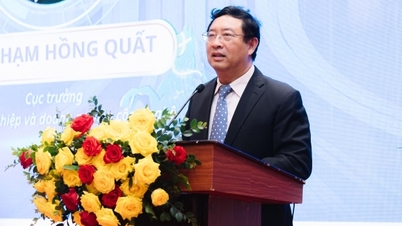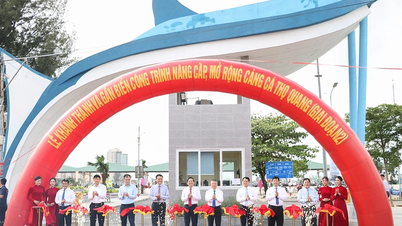
According to the Ministry of Information and Communications , 54 localities in Vietnam have currently implemented projects related to smart cities, focusing on areas such as transportation, environment, healthcare, and administration. However, only about 30% of these projects have achieved a level of data integration across sectors and fields.
"Currently, data is scattered, lacks consistency, and is limited in its ability to support decision-making," said Mr. Ho Duc Thang, Deputy Director of the National Digital Transformation Department, Ministry of Information and Communications.
In reality, a synchronized database not only supports administrative reform but also serves as a foundation for developing smart applications. Lieutenant Colonel Nguyen Thanh Vinh, Director of the National Population Data Center, shared: “The national population data system has now integrated more than 87.9 million personal information records, facilitating electronic identification services and improving the efficiency of public services.” This not only saves time and costs but also increases transparency in management.

Currently, many localities across the country have achieved outstanding results in this endeavor. In Da Nang, the interconnected data system has helped the city to operate intelligently and optimize public services. Provinces such as Binh Duong and Quang Ninh are also strongly implementing IoT and big data solutions to enhance management capacity and promote the development of the digital economy. These models not only bring individual value but also create a foundation for cooperation and experience sharing among localities.
According to Mr. Tran Ngoc Thach, Deputy Director of the Da Nang Department of Information and Communications, the Intelligent Operations Center (IOC) has become a model for data application in urban governance. He stated: “Integrating data from more than 20 agencies not only helps to manage effectively but also opens up opportunities for developing innovative applications from the community.” Thanks to this interconnectedness, Da Nang has become one of Vietnam's pioneering cities in the field of digital transformation.

An indispensable element in this picture is the exploitation of big data. Dr. Cu Kim Long, an AI and big data expert at the Institute of Information Technology, Vietnam National University, Hanoi, stated: "Big data not only helps predict trends such as climate change or population growth but also plays a crucial role in enhancing the competitiveness of cities globally."
At the conference, many experts pointed out that, for data to truly become the "heart" of a smart city, ensuring information security is a prerequisite. Ms. Vo Thi Trung Trinh, Deputy Director of the Ho Chi Minh City Digital Transformation Center, stated: "Data systems need to be built on a solid security foundation to protect citizens' privacy and build trust with the community."
In the journey of building smart cities, the roles of businesses, government, and the community are inseparable. From large corporations to small and medium-sized enterprises, all contribute to providing technological solutions and digital services, supporting more effective urban governance. To promote this participation, building a "common playing field" through a synchronized digital government architecture and clear policy mechanisms is a prerequisite.
However, one of the biggest challenges is that current data remains fragmented and lacks interconnectedness. This is not only a national issue but also occurs between provinces and cities, where data systems have not been synchronized to support regional development. Promoting the use of common platforms and peer-to-peer data sharing among localities will help reduce costs and optimize resources, while creating greater efficiency in public service delivery and urban management.
The journey of digital transformation and smart city development is not the story of a single city or province, but a shared responsibility of all localities. The synergy between provinces and cities, from North to South, will be key to Vietnam building a sustainable and modern smart city network.
Source: https://kinhtedothi.vn/co-so-du-lieu-la-chia-khoa-xay-dung-thanh-pho-thong-minh.html



![[Photo] Prime Minister Pham Minh Chinh presides over the conference announcing the establishment of the International Finance Centre in Vietnam.](/_next/image?url=https%3A%2F%2Fvphoto.vietnam.vn%2Fthumb%2F1200x675%2Fvietnam%2Fresource%2FIMAGE%2F2025%2F12%2F21%2F1766309817714_ndo_br_dsc-3400-jpg.webp&w=3840&q=75)

![[Photo] Prime Minister Pham Minh Chinh presides over a meeting on private sector economic development.](/_next/image?url=https%3A%2F%2Fvphoto.vietnam.vn%2Fthumb%2F1200x675%2Fvietnam%2Fresource%2FIMAGE%2F2025%2F12%2F20%2F1766237501876_thiet-ke-chua-co-ten-40-png.webp&w=3840&q=75)



































































































Comment (0)